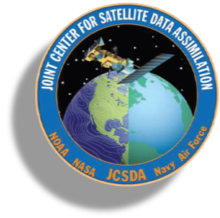15th jcsda technical review & science Workshop
May 17-19, 2017
Introduction
The Joint Center for Satellite Data Assimilation (JCSDA) is a multi-agency (NASA, NOAA, USAF, and USN) that supports scientific development in multiple areas for the purpose of accelerating and optimizing the assimilation of satellite data in operational environmental prediction modeling systems. The JCSDA partner agencies conduct their own internal projects, some of which are directly related to the JCSDA projects and science priorities. These projects are labeled internal or in-kind contributions to JCSDA. In addition, the JCSDA support external research is funded via grants and contracts awarded through competitive processes open to the broader scientific community. It is essential that all these efforts be complementary to and coordinated with one another.
The JCSDA Technical Review Meeting and Science Workshop aims at facilitating this coordination, and is conducted to assess the on- going and planned scientific development sponsored by the JCSDA. Two full and one half days will be devoted to the meeting, with ample time for informal discussions, interactions, scientific exchanges, as well as for formal presentations, both among scientists from all JCSDA partners and with JCSDA managers. Recommendations from project team discussions that take place during the meeting will be reviewed by the JCSDA management, and will serve as one of the inputs when developing technical directions of the JCSDA future activities. The JCSDA has the following six primary scientific priority areas, approved by the JCSDA Science Steering Committee:
Community Radiative Transfer Modeling (CRTM)
Preparation for assimilation of new data and data from new instruments
Assimilation of satellite data impacted by clouds and precipitation
Assimilation of land surface satellite observations
Assimilation of ocean surface satellite observations
Atmospheric composition; chemistry, and aerosols
Recently the JCSDA has begun to manage these efforts through a set of Project Teams, including:
Community Radiative Transfer Modeling (CRTM)
New and Improved Observations (NIO)
Sea-ice, Ocean, Coupled Assimilation (SOCA)
Joint Effort for Data assimilation Integration (JEDI)
Impact of Observing System (IOS)
Global Forecast Dropout Prediction Tool (GFDPT)
Organization and Programming of the Meeting
The JCSDA Technical Review Meeting and Science Workshop on satellite data will feature both oral presentations, including invited talks, and posters. No parallel sessions will be held. In order to allow for open discussion, plenty of time will be available to presenters to interact with the audience. Adequate visibility will be provided to contributions from all current Projects and Scientific Priority Areas, as well as emerging ones. Externally funded scientists are expected to attend and should give a progress report and indicate what they plan to do over the next year. An oral presentation is expected from the externally funded scientists.
There will also be a dedicated poster session. Note that posters will be mounted on their panels the first morning of the meeting and will remain on display until the end of the meeting. This arrangement will allow scientists to discuss the content of the posters not only during the poster session but also during coffee breaks and lunch breaks. The duration of the meeting will be two full and one half days (finishing at noon on the third day).
Registration and Other Logistics
Participation in the meeting is free of charge. Arrangements for coffee and lunch breaks are being made, and information regarding how to order and pay for these will be shared in the next circular.
Location
The 15th JCSDA Technical Review Meeting & Science Workshop on Satellite Data Assimilation will be hosted in the NCWCP building in College Park, Maryland. This location offers convenient access to the Metro public transit system of the Washington, DC area (College Park/Univ. of MD Metro station, and the Metro bus). It is also within walking distance of downtown College Park, MD.
For dining and accommodation options in College Park:
http://shopcollegepark.org.
Parking
For parking, participants are invited to park in the NCWCP parking. Note that a Government-issued ID may be required.
Presentation Uploading
Presenters (both oral and poster) are encouraged to submit their presentations ahead of time, by sending an email to Ling.Liu@noaa.gov with CC to Ana.Carrion@noaa.gov and James.G.Yoe@NOAA.gov. The preferred format is pdf or PPT.
